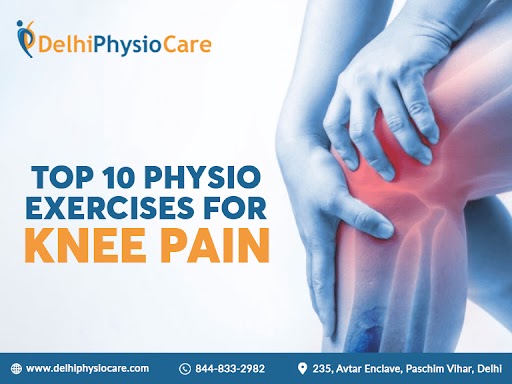
Knee pain is a very common complaint, affecting people of all ages and activity levels. It can feel like a dull ache, a sharp jab, or a burning sensation, and can be located anywhere around the knee joint. The severity and location of the pain can provide clues about the underlying cause.
Here are some of the most common causes of knee pain:
Injuries:
- Ligament sprains or tears: These can occur with sudden twisting or hyperextension of the knee, causing pain, swelling, and difficulty bearing weight.
- Meniscus tears: The menisci are cartilage pads that cushion the knee joint. Tears can occur with trauma or
- degeneration, causing pain, clicking or popping sounds, and stiffness.
- Fractures: A break in one of the bones around the knee, such as the patella (kneecap), tibia (shinbone), or fibula, can cause significant pain, swelling, and deformity.
Overuse and degenerative conditions:
- Patellofemoral pain syndrome (PFPS): This is inflammation of the cartilage behind the kneecap, often caused by overuse or misalignment of the kneecap. It can cause pain with activities like squatting, climbing stairs, or running.
- Osteoarthritis: This is the most common type of arthritis, and it occurs when the cartilage in the knee joint
- wears away. It can cause pain, stiffness, and difficulty bending the knee.
- Bursitis: This is inflammation of the fluid-filled sacs that cushion the knee joint. It can cause pain, swelling, and tenderness in the affected area.
- Tendinitis: This is inflammation of the tendons around the knee joint, often caused by overuse. It can cause pain, tenderness, and difficulty performing certain activities.
Other causes:
- Infections: In rare cases, bacteria or viruses can infect the knee joint, causing pain, swelling, redness, and fever.
- Gout: This is a metabolic condition that can cause sudden and severe pain in the knee joint, along with redness and swelling.
- Tumor: While rare, tumors can occasionally develop in the knee joint or surrounding tissues, causing pain and other symptoms.
It’s important to note that this is not an exhaustive list, and if you are experiencing knee pain, it is important to consult a healthcare professional for proper diagnosis and treatment.
Top 10 Physio Exercises for Knee Pain
Physiotherapy offers a powerful toolkit of exercises that can tame knee pain and restore your joy of movement.
These exercises are not just about temporary relief; they’re about rebuilding strength, restoring flexibility, and creating resilience against future flare-ups.
Remember, every knee’s story is unique, and these exercises offer a foundation, a starting point on your personalized journey toward pain-free freedom.
- Straight Leg Raise: Simplicity belies power. Lie on your back with one leg straight and gently lift it a few inches off the ground. Hold for a few seconds before lowering. Repeat with the other leg. This strengthens your quadriceps, crucial for knee stability.
- Wall Slides: Engage your core and stand close to a wall with your heels flat on the ground. Slowly slide your back down the wall as if sitting in a chair, keeping your knees aligned with your ankles. Return to starting position by pressing through your heels. This builds hamstring and core strength, vital for knee support.
- Clamshells: Side-lying is your secret weapon. Stack your knees and gently lift the top knee towards the ceiling, keeping your feet together. This activates your gluteus medius, stabilizing your knee joint and preventing pain.
- Heel Clicks: Stand tall and balance on one leg. Gently tap your heel against your non-weight-bearing calf or shin a few times. Repeat on the other side. This improves balance and proprioception, reducing your risk of falls and knee injuries.
- Calf Raises: Standing or seated, rise up on the balls of your feet, hold for a second, and then slowly lower back down. Repeat the movement. This strengthens your calf muscles, aiding in shock absorption and knee stability.
- Hamstring Stretch: Sit on the floor with your legs extended. Lean forward from your hips, reaching towards your toes (or as far as you comfortably can) without rounding your back. Hold for 30 seconds. This lengthens your hamstrings, preventing tightness that can pull on your knee joint.
- Quad Stretch: Standing tall, grab one foot behind your thigh and gently pull your heel towards your glutes. Hold for 30 seconds. Repeat on the other side. This stretches your quadriceps, reducing tightness and improving flexibility.
- Mini Squats: Stand with your feet shoulder-width apart, toes slightly outward. Slowly lower yourself as if sitting in a chair, but only bend your knees to a comfortable angle. Hold for a second before pushing back up. This strengthens your leg muscles without overly stressing your knees.
- Range of Motion Exercises: Gently bend and straighten your knee through its full range of motion without pain. You can do this lying down, sitting, or standing. This maintains your knee’s mobility and prevents stiffness.
- Foam Rolling: Release tension in your quads, hamstrings, and calves by rolling them gently on a foam roller. Apply light pressure and move slowly. This improves blood flow and promotes muscle recovery.
Consult the Experts at DelhiPhysioCare:
These exercises are your starting point, your roadmap to conquering knee pain. However, the true journey lies in understanding your body, listening to its cues, and building resilience.
Physiotherapists at DelhiPhysioCare can not only guide you through these exercises but also tailor a personalized program based on your specific needs and pain triggers.
At DelhiPhysioCare, we understand the debilitating nature of knee pain.
Our team of expert physiotherapists is dedicated to guiding you towards a pain-free future. We believe in a holistic approach, addressing not just the pain but also the underlying causes, ensuring long-lasting results, and empowering you to take control of your well-being.
Don’t let knee pain dictate your life’s adventures. Take the first step towards reclaiming your active lifestyle.
Contact DelhiPhysioCare today at +91 844-833-2982 or visit our website to schedule a consultation.
